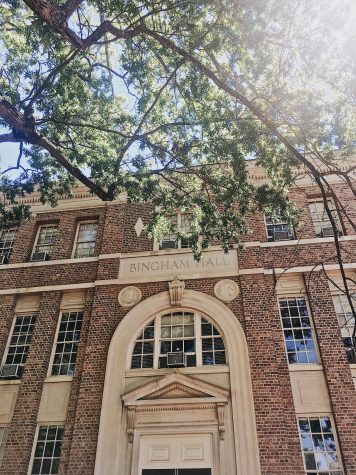UNC-Chapel Hill lifts ban on renaming buildings; petitions, SGA advocate for App State to follow
June 17, 2020
A 16-year ban on renaming UNC-Chapel Hill campus buildings was lifted at a special UNC board of trustees meeting Wednesday morning, voting 11-2.
In May 2015, the board voted unanimously for a 16-year freeze on renaming buildings. Trustees will work to set guidelines for renaming.
The Daily Tar Heel cites a 2015 article by Carolina Alumni Review saying the board put the freeze in place to “allow the university time to develop new education initiatives and evaluate their effectiveness.”

(Xanayra Marin-Lopez)
The Board also voted to rename Saunders Hall in 2015, named after alumnus William Lawrence Saunders, a Confederate Civil War colonel and North Carolina chief organizer of the Klu Klux Klan. It was renamed Carolina Hall and features an exhibit of the building’s name history.
StrikeDownSam, an anti-racist coalition of UNC students seeking the removal of Silent Sam, a statue of a confederate soldier, took to Twitter to credit Black organizers for the lift of the ban.
Cite ALL this Black organizing labor (thread below) when you speak about removals & renamings at UNC
Lenior strike
Foodworkers walkout
Black Awareness Council
Students Seeking Historical Truth
The Real Silent Sam Coalition
Maya Little
Black Student Movement
Black Congress https://t.co/bCbH14owWq— #StrikeDownSam (@strikedownsam) June 17, 2020
Petitions to change the names of App State residence halls Hoey and Lovill, named after white supremacists, have been discussed over the years, but have recently resurfaced via social media during the past few months.
Hoey Residence Hall is named after Clyde R. Hoey, a North Carolina politician. He held roles in the general assembly, U.S Senate, U.S. House of Representatives and as governor. Many of the policies Hoey pushed for as a southern Democrat advocated for segregation.
While serving as a Representative, Hoey was in favor of disenfranchising black people, according to App State library archives.
Lovill Hall is named after Edward Francis Lovill, a Confederate army officer during the Civil War. In 1920, he was elected to the North Carolina Senate as a “Democrat of the purest type,” according to App State library archives.
In 2017, SGA passed a bill titled “The Renaming of Residential Halls Act of 2017” though no changes have been made.
In response to the death of George Floyd and the Black Lives Matter Movement, SGA released a statement June 8 standing in solidarity against police violence and listed a set of action items for the upcoming year. One of these included advocating for the immediate name change of all residential halls named after Confederate soldiers, leaders and generals.










